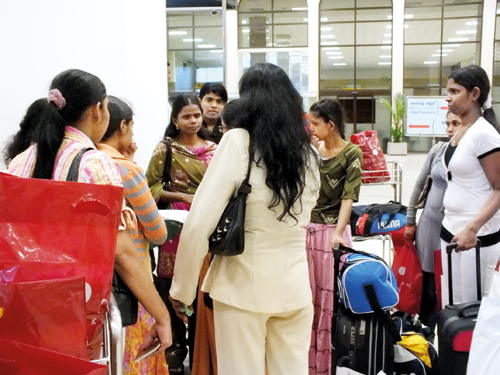Migrant worker remittances grew by 5% in 2020 despite many returnees
View(s):
File picture of migrant workers at the airport.
While air ticket prices soared beyond the reach of Sri Lankan migrant workers desperate to return in 2020 during the pandemic, an interesting development was that despite large numbers returning, remittances by workers grew by 5 percent in 2020, according to one of the country’s foremost researchers on labour migration.
There were many reasons for the increase in remittances during a pandemic-affected period, asserted Dr. Bilesha Weeraratne, Research Fellow, Institute of Policy Studies (IPS), speaking during an IPS webinar titled “Pandemics and Disruptions: Safeguarding Lives and Livelihoods of Sri Lankans” on Wednesday.
“There were many reasons for the growth in remittances like for example informal remittance channels being closed due to the lockdown and workers increasing their remittances through formal channels. Furthermore workers who were terminated would have got lump sums as terminal benefits which were remitted while another reason would have been nobody returning would have wanted to carry cash on their return as they had to check into a quarantine centre on arrival,” she noted.
She said Sri Lanka sends 225,000 workers abroad while foreign exchange earnings annually is US$7 billion annually. In 2020, there were only 53,713 registered departures but remittances increased.
How did workers cope in West Asia during the pandemic? She said 128,470 wanted to return in early January 2021 but they had to wait for 4.5 months for their repatriation to be arranged.
“Ticket prices also soared. A ticket from South Korea to Sri Lanka was selling at Rs.220,000 whereas the earlier rate was Rs.80-90,000. Migrant workers spent their savings on surviving in the destination countries,” she added.
The country’s policy of returning migrants during a crisis (when insurance often meets their ticket needs) was not implemented and they had to spend on air tickets. She said there needs to be a reintegration policy for economic, social and physical support. The authorities’ support was limited to immediate health support – testing, quarantine and vaccination.
Meanwhile there were many issues in the vaccination process and the vaccines were not procured and distributed in an organised manner. There was also inadequate information on vaccines for would-be migrant workers as to which vaccine is accepted by the labour-destination country. The authorities initially advised all would-be migrant workers to register for the first vaccine which was then given without any condition but when the second vaccine was given, these workers had to get registered – for a fee – at the Foreign Employment Bureau, she added
Dr Nisha Arunatilake, Research Director, IPS said that according to International Labour Organisation statistics, 225 million people lost their jobs globally in 2020 to the pandemic while that number is Sri Lanka was 150,000. The unemployment rate rose in 2020 which was most widely seen among youth employment and much of it was in low quality jobs.
The pandemic affected female workers who were in the high risk group (of potentially losing employment). While the government provided various relief packages to affected workers, she said it was not big enough similar to that experienced in other countries. According to a recent survey among workers and employers, it was suggested that the Government should have utilised social protection schemes like the EPF and ETF to help vulnerable groups, a step that other countries took, using pre-retirement schemes to help workers.
The pandemic has shown the need to have pre-retirement social protection schemes to support workers in health and other needs, she said adding that while the Government provided Rs.5,000 in cash transfers to some workers in the informal sector, this was inadequate. There is a need for a separate fund to deal with crises during pre-retirement times like sickness, etc.
In the field of education, schools were closed since March 2020 – except opening for a few days – and the current closure is more than that seen in other countries. There is a need to adjust curriculum and maintain a consistent education policy while better mechanisms are needed to monitor impact of closures, she said.
Responding to a question, she said that it was unfortunate that teachers were on strike and online lectures couldn’t be held emphasising the importance of the Government arriving at an amicable settlement with teachers on salary anomalies.
She said there is a need to look at all sectors to address salary anomalies without granting benefits to only one sector.
Madhavie Gunawadena, Director – Administration and Corporate Affairs, Telecommunications Regulatory Commission of Sri Lanka, said that female workers were the worst affected during the pandemic as they had to balance their children’s work at home while also juggling with their jobs.
Dr. Kolitha Wickramage, Global Health Research and Epidemiology Coordinator, International Organisation for Migration, said that more males returned from overseas than females as they were skilled workers able to pay the costs including airfares and the compulsory quarantine period in Sri Lanka. Domestic workers were unable to afford these costs and hence had to remain abroad till formal repatriation was arranged.


